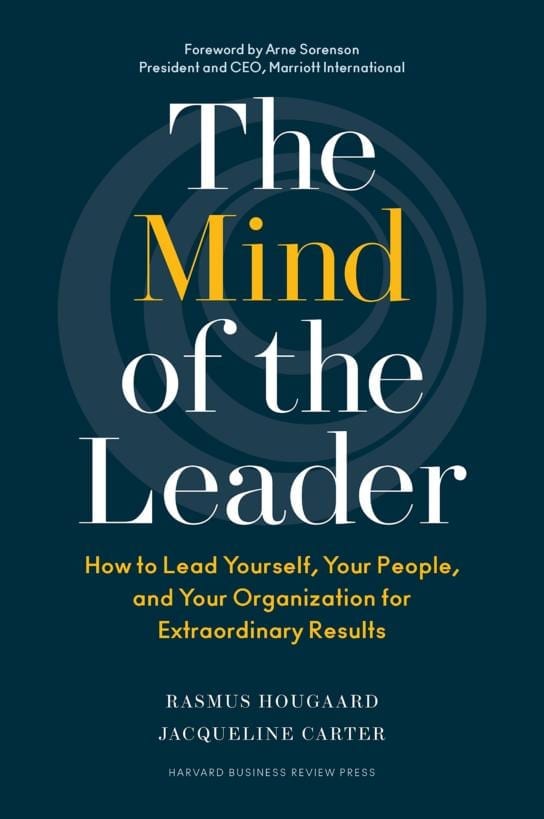The Focus of a Mindful Leader
By Rasmus Hougaard and Jacqueline CarterFor today’s leaders, mindfulness—training the mind to be more focused and aware—is becoming a survival skill and a cornerstone of self-leadership. The pressure on leaders is increasing, as are the pace of change, the volume of information available, and the scale of complexity. A managing director of a global consulting firm told us that he had exhausted every tool on the market that promised to help him become more effective. He had applied all of the most popular time-management techniques. He had tried all of the newest productivity software. He had incorporated the latest collaborative platforms. And yet he was still working as many hours as he possibly could. No additional apps could help, no more techniques could be applied, and no more minutes could be squeezed into the workday. He had run out of possible solutions.
His last resort: Train his mind.
With this realization, he became part of the global movement of leaders who are practicing mindfulness to increase awareness and improve focus.
Mindful awareness helps us to switch off the autopilot and get in the driver’s seat of our mind. Mindful focus helps us to be more effective and improve our well-being.
 Leaders—and people at work in general—have a problem. Our ability to focus and manage our minds is deteriorating. Research has found that we’re distracted from what we do 47 percent of the time. That’s an alarming number. Throughout any given day, we’re constantly thinking about things that happened in the past and things that happened in the past and things we need to do in the future. Meanwhile, we’ve lost focus on what’s happening right now. Although this research is a bit depressing, it also presents a massive potential for improved performance.
Leaders—and people at work in general—have a problem. Our ability to focus and manage our minds is deteriorating. Research has found that we’re distracted from what we do 47 percent of the time. That’s an alarming number. Throughout any given day, we’re constantly thinking about things that happened in the past and things that happened in the past and things we need to do in the future. Meanwhile, we’ve lost focus on what’s happening right now. Although this research is a bit depressing, it also presents a massive potential for improved performance.
In our survey results, we found that 71 percent of leaders feel distracted from their current task either “some” or “most” of the time. We also found that 67 percent of leaders view their minds as cluttered, with lots of thoughts and a lack of clear priorities. As a result, 65 percent find that they fail to complete their most important tasks. When asked about the primary challenges to maintaining focus, the leaders answered that the biggest sources of distractions are the demands of other people (26 percent), competing priorities (23 percent), general distractions (13 percent), and workloads that are too big (12 percent). Not surprisingly, 96 percent of the leaders we surveyed said that enhanced focus would be valuable or extremely valuable.
With the excessive number of distractions we face, attention deficit has become the norm in businesses. Thomas Davenport, author of The Attention Economy, wrote: “Understanding and managing attention is now the single most important determinant of business success.”
The “attention economy” is an apt term for our current organizational environments. In today’s business world—with its seemingly endless distractions—our ability to focus is just as important as skills like financial analysis and time management. If there is one secret to effectiveness, said leadership pioneer Peter Drucker, it’s concentration. In our age of information overload, this is truer now than ever before.
Imagine a standard ten- to twelve-hour workday, with back-to-back meetings, a nonstop stream of emails, and the need to make good decisions in constantly shifting and complex contexts. The ability to apply calm and clear focus to the right tasks, at the right time, in the right way, is what makes a leader exceptional. Even one second of misplaced focus is enough to miss a critical cue from a client during a tough negotiation.
Productivity has traditionally been measured in terms of time and competency: how much time we have for a task and our ability to solve it efficiently. But in an attention economy, focus is now such a scarce leadership resource that it overshadows time and competence. Imagine you spent thirty minutes on a task, occasionally checking your email and dealing with other distractions. The task itself should have only taken ten minutes, but you weren’t able to maintain a clear focus. That’s a significant loss in productivity. But the problem wasn’t mismanaged time—it was mismanaged focus.
In this light, a simple equation for productivity in the attention economy is Focus x Time x Competence = Productivity. Without focus, you will spend more time on a task and your productivity will be negatively impacted.
There also seems to be a direct correlation between people’s level of focus and the advancement they make in their companies. Of the thousands of leaders we’ve worked with over the years, the vast majority posses an above-average ability to focus. This is not to say that exceptional focus is a sure way to the top. But certainly, without focus, career success will be much more difficult to attain. For aspiring leaders, focus should be a daily mantra.
Through our research and fieldwork, we’ve come to a clear conclusion: focus must be at the forefront of any—and all—leadership training. The leaders we interviewed for this book all emphasized their need to cultivate and protect their focus amidst the relentless flow of details and distractions that assault their minds.
And yet, in our view, the business world is not focused enough on focus.
Consider these questions. When were you last exposed to focus training during a leadership development program? When did you last consider a calm, clear focus as part of an effective way to use your time? Just in the past week, how often have you experienced unfocused or distracted people in meetings?
Focus is rarely part of a training program or considered critical to effective time management. And many people are distracted during meetings, but they are rarely called out on it. This leads to a great evolutionary irony: for most of human history, being prone to distraction ensured survival. Our alertness to sounds, smells, and movements that could indicate a threat was vital to our continued existence.
But today, the survival paradigm has reversed. In today’s distracted office environments, only the focused survive. And certainly, only the focused excel. All of the C-suite executives we interviewed shared stories of the importance of focus to survive and more importantly, to thrive. It was one of the qualities they considered as key to their success and valued for their people and their organizations.
But it’s not easy to maintain focus. From a neurological perspective, we are wired for distractions. Part of our brain is devoted to constantly scanning our surroundings and reporting any new information of importance that may require our attention. The tendency to be distracted ingrained in older parts of the brain like the temporal cortex and posterior cingulate cortex. Test it for yourself. Stop reading and pay attention to your surroundings. Is your attention naturally directing itself toward movements and sounds?
Distraction is the default setting of human brain. Focus occurs mainly in the pre-frontal cortex, the newest part of our brain.
The pre-frontal cortex is also the home of executive function, which is our ability to deliberately choose our actions and behavior. When we are able to operate more out of this part of our brain, we have greater ability to minimize the noise from our wandering mind, are more focused on the task at hand, and can take deliberate actions when engaging meaningfully with our people.
Rasmus Hougaard is the Founder and Managing Director of Potential Project, the global leading provider of leadership and organizational effectiveness solutions based on training the mind. Rasmus has practiced and taught mindfulness for more than two decades. Jacqueline Carter is an International Partner and North American Director for Potential Project. She has over twenty years of experience working with organizations around the globe to enhance effectiveness and improve performance. Together, they are the authors of One Second Ahead: Enhance Your Performance at Work with Mindfulness.
Adapted from The Mind of the Leader: How to Lead Yourself, Your People, and Your Organization for Extraordinary Results, published by Harvard Business Review Press, Copyright © 2018 by Rasmus Hourgaard and Jacqueline Carter
Please join Jacqueline Carter on October 9, 2018 at 6pm at Delos Living, in Manhattan as she discusses her book with James Gimian, the Executive Director for the Foundation for a Mindful Society. To register, please click here.
Illustration by Marion Barraud for Harvard Business Review

I spoke about this very topic today and strongly believe this is the way forward to fight through the busyness of the day. We have introduced mindfulness across our school with a focus on attention and focus. Thank you for this excerpt.